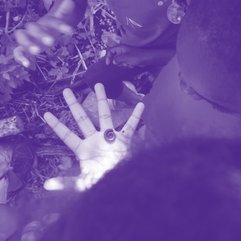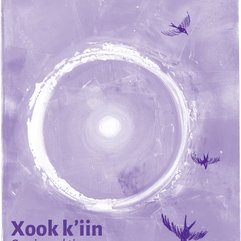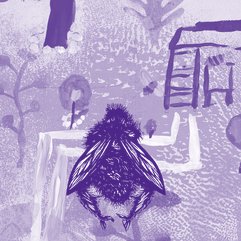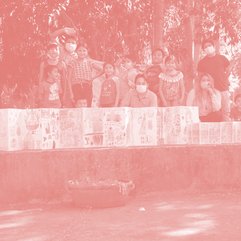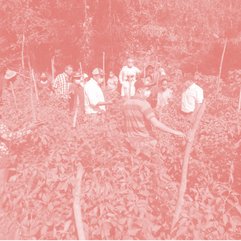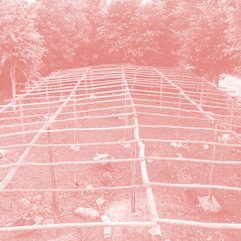Spore Hosts: THE BIG CHILL
One-Day Symposium
11.00-18.00
Save the Date
for adults
in German/in English

At the invitation of Candice Breitz, symposium guests Michael Barenboim, Daniel Bax, Yasmeen Daher, Alexander Gorski, Pauline Jäckels, Nadezda Krasniqi, Jerzy Montag, Michael Rothberg, Nahed Samour and Charlotte Wiedemann will discuss the modes of silence and array of silencing mechanisms that constitute the chilling effect that has settled over German public discourse in the wake of the horrific atrocities of 7 October 2023 and the unspeakably grotesque and disproportionate violence that Palestinians have been subject to both leading up to and since that date.
Since 7 October, despite the International Court of Justice having ruled that it is plausible that Israel has committed acts that violate the Genocide Convention, much of German civil society has opted for silence in relation to the catastrophic death toll in the occupied Palestinian territories, a silence that to some extent betrays the fear of being branded antisemitic under the vague logic of German Staatsräson and/or the IHRA’s working definition of antisemitism. Parallel to this broad display of anticipatory obedience, Palestinians, progressive Jews and their allies have been muted, de-platformed, stigmatized (and at times even criminalized) with voracious frequency. A series of anti-democratic measures have been applied (or are currently being drafted) to the ends of curbing and censuring non-violent opinions that lie well within constitutional parameters yet run counter to the increasingly dogmatic discourse that has been perpetuated by Germany’s political class (and reproduced, with ominous consistency, across much of its press landscape).
Symposium participants will consider how perceived and/or actual restrictions on freedom of speech, freedom of political opinion, freedom of assembly and academic freedom have led to the normalisation of repressive attitudes and policies towards a range of racialised minorities that are too often cast as ‘other’ to white Germany—as well as towards intellectuals, artists, activists, journalists and students.
Silence can signify in a variety of ways. It can be imposed or self-chosen. It can be a consequence of social, ideological or legal coercion. It can betray deep apathy or cloak deep empathy. It can be a necessary tool of self-preservation. To what extent have silencing mechanisms and related discourses of exclusion gained support under the cover of political initiatives that promise to afford greater safety to Jewish life in Germany and beyond? To what extent have communities that are already deeply impacted by prejudice, become increasingly vulnerable as heated discourse pertaining to Israel-Palestine continues to polarize the public sphere? How can we collectively work towards the breaking of repressive silences?
‘The Big Chill’ is curated by Candice Breitz. The symposium is funded by the Hochschule für Bildende Künste Braunschweig, with support from Spore Initiative.

 Candice Breitz, Never Again (200 watermelons), 2024.
Candice Breitz, Never Again (200 watermelons), 2024.11:00 a.m. – 2:00 p.m.
MODES OF SILENCE
[ Morning Session ]
11:00 a.m.
Opening Words / Candice Breitz (EN)
11:30 a.m.
Keynote / Nadezda Krasniqi (DE)
12:00 p.m.
Three Perspectives: Modes of Silence
12:00 p.m.: Perspective / Yasmeen Daher (EN)
12:20 p.m.: Perspective / Charlotte Wiedemann (EN)
12:40 p.m.: Perspective / Michael Rothberg (EN)
1:00 p.m.: Conversation between the speakers, moderated by Daniel Bax
The morning session will include German and English contributions.
There will be no translation.
____
2:00 p.m.
Lunch Break
____
3:30 – 6:00 p.m.
MECHANISMS OF SILENCE
[ Afternoon Session ]
3:30 p.m.
Keynote / Michael Barenboim (EN)
4:00 p.m.
Three Perspectives: Mechanisms of Silence
4:00 p.m.: Perspective / Jerzy Montag (DE)
4:20 p.m.: Perspective / Nahed Samour (DE)
4:40 p.m.: Perspective / Alexander Gorski (DE)
5:00 p.m.: Conversation between the speakers, moderated by Pauline Jäckels
The afternoon session will include German and English contributions.
There will be no translation.




